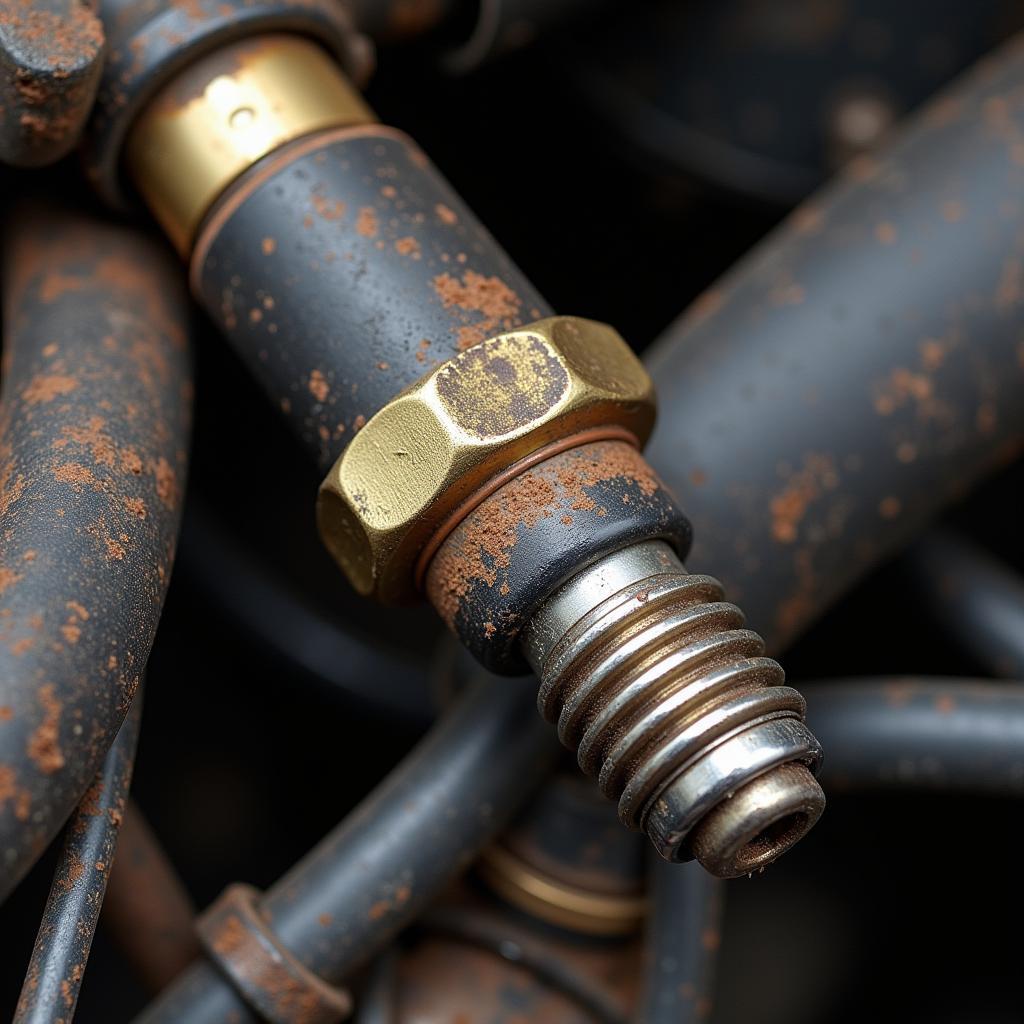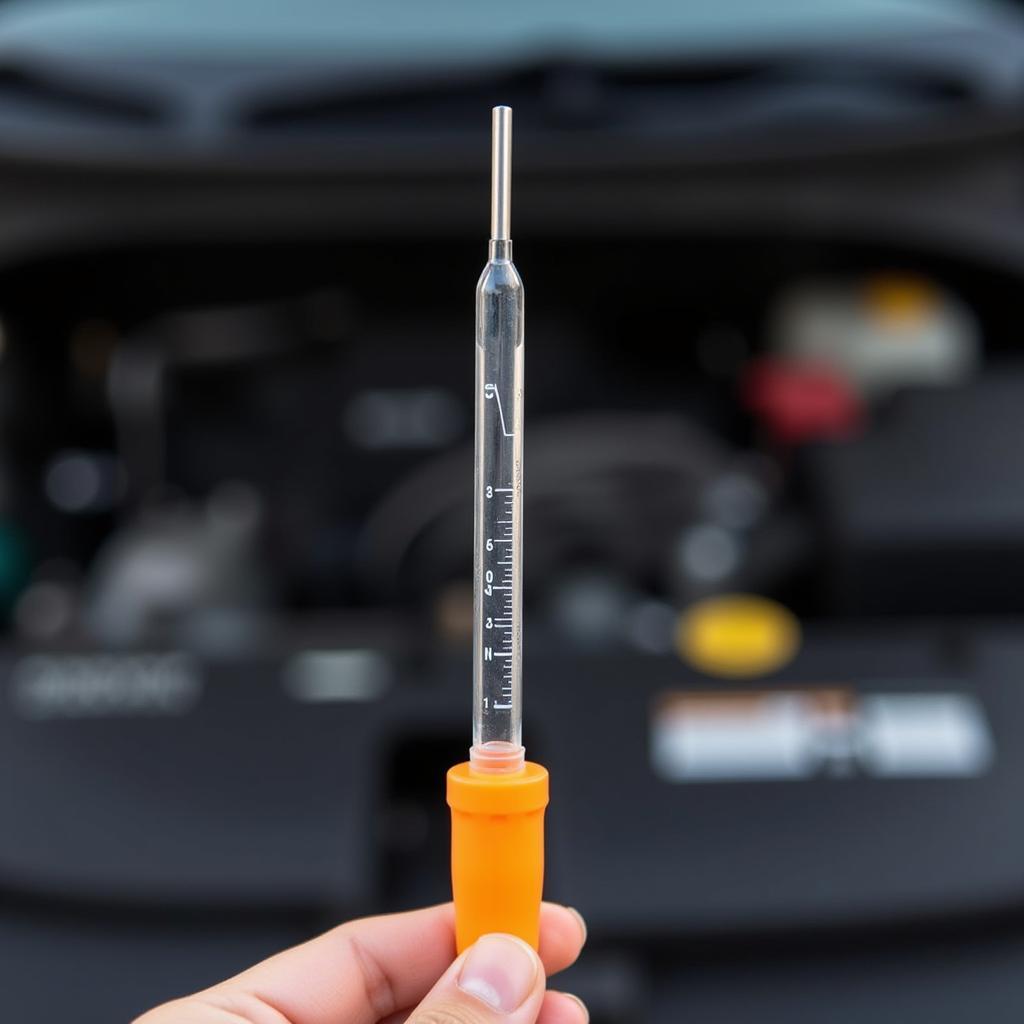A malfunctioning car AC system can turn a comfortable drive into a sweaty ordeal. If you suspect your car AC line is the culprit, this guide is for you. We’ll cover everything you need to know about identifying, diagnosing, and fixing car AC line problems.
One common issue many car owners face is a leaking car AC line. If you’re experiencing similar problems, you can find a helpful guide on fixing leaking car ac lines.
What is a Car AC Line and Why is it Important?
The car AC line is a network of metal tubes and hoses responsible for carrying refrigerant throughout the system. This refrigerant, when compressed and allowed to expand, creates the cool air that keeps your car’s cabin comfortable.
A leak or damage in the AC line disrupts this process, leading to inefficient cooling or a complete AC failure.
Common Car AC Line Problems
Several issues can arise with your car AC line, including:
- Leaks: These are the most common problem and can occur due to corrosion, wear and tear, or damage from road debris.
- Clogs: Dirt, debris, or even insects can clog the AC line, restricting refrigerant flow.
- Damage: Physical damage from accidents or improper repairs can also compromise the AC line.
Diagnosing a Car AC Line Problem
Identifying the specific problem with your car AC line is crucial for effective repair. Here are some signs to look out for:
- Poor Cooling: If your AC isn’t blowing cold air as effectively as before, it could indicate a leak or clog in the system.
- Hissing Sounds: A hissing sound coming from the engine bay when the AC is on often suggests a refrigerant leak.
- Visible Oil Leaks: Refrigerant carries oil to lubricate the system. Visible oil around AC components could point to a leak.
- Foul Smell: A musty odor from the vents could indicate mold growth due to a clogged AC drain line. If you’re experiencing this, you might find our guide on car ac drain fix helpful.
How to Fix a Car AC Line
Fixing a car AC line often requires specialized tools and knowledge. While some minor repairs can be tackled by experienced DIYers, it’s generally recommended to consult a qualified mechanic, especially for:
- Locating Leaks: Mechanics use specialized leak detectors to pinpoint the exact location of leaks, which can be very small and difficult to find visually.
- Repairing Leaks: Depending on the severity and location of the leak, repair might involve replacing damaged sections of the line, sealing leaks with epoxy, or replacing O-rings and seals.
- Flushing the System: After repairing a leak, the system needs to be flushed to remove any contaminants and moisture before recharging with fresh refrigerant.
Preventing Car AC Line Problems
Regular maintenance can significantly extend the life of your car AC system and prevent costly repairs:
- Regular AC Service: Get your car’s AC system serviced annually or as recommended by your vehicle manufacturer. This usually involves checking refrigerant levels, inspecting for leaks, and cleaning or replacing cabin air filters.
- Visual Inspections: Regularly inspect the visible parts of your AC system for signs of damage, leaks, or loose connections.
- Run the AC Regularly: Even during colder months, run your AC system for a few minutes every couple of weeks to keep the refrigerant circulating and prevent seals from drying out.
DIY vs. Professional Repair
While some minor car AC line repairs might seem tempting to tackle yourself, it’s crucial to consider the complexity and potential risks involved.
“Working with AC systems involves handling refrigerant, which can be dangerous if not handled properly,” says John Miller, a certified automotive technician with over 20 years of experience. “Improper repairs can also lead to further damage and costly repairs down the road.”
Here’s a quick comparison to help you decide:
| Feature | DIY Repair | Professional Repair |
|---|---|---|
| Cost | Lower upfront cost | Higher upfront cost |
| Expertise | Requires specialized knowledge and tools | Performed by trained technicians with specialized equipment |
| Safety | Risk of refrigerant exposure and improper handling | Safe handling of refrigerant and proper disposal |
| Warranty | No warranty on repairs | Most repairs come with a warranty |
Cost of Fixing Car AC Line
The cost of fixing a car AC line can vary greatly depending on the severity of the problem, the make and model of your vehicle, and labor rates in your area.
Here’s a general idea of what you might expect:
- Locating a Leak: $50 to $200
- Repairing a Leak: $150 to $1,000+ (depending on the extent of the repair)
- Replacing a Line: $200 to $500+ (depending on the line needing replacement)
- Flushing the System: $100 to $200
- Recharging the System: $100 to $200
If you’re interested in getting an estimate for your specific car model, you can check out our guide on [cost to fix my car ac](http://autotippro.com/cost-to fix-my-car-ac/). Additionally, if you’re experiencing issues with your car’s AC compressor, you might find our article on how to fix ac compressor on car useful. It provides a detailed walkthrough of common AC compressor problems and potential solutions.
Conclusion
A properly functioning car AC system is essential for a comfortable driving experience, especially during warmer months. Understanding the importance of your car AC line and addressing problems promptly can save you from discomfort and costly repairs in the long run.
If you suspect an issue with your car AC line, it’s always best to consult a qualified mechanic for diagnosis and repair.
Need help with your car’s AC system? Contact AutoTipPro today at +1 (641) 206-8880 or visit our office at 500 N St Mary’s St, San Antonio, TX 78205, United States. Our team of expert technicians is here to keep you cool and comfortable on the road.
FAQs
Q: How often should I recharge my car’s AC?
A: Ideally, you shouldn’t need to recharge your car’s AC system frequently. If your system needs frequent recharging, it likely has a leak that needs to be addressed.
Q: Can I use a DIY AC recharge kit?
A: While DIY recharge kits are available, it’s generally not recommended unless you have experience working with AC systems and handling refrigerant safely.
Q: Can a bad car battery affect my AC?
A: While a bad battery might affect your car’s electrical system overall, it won’t directly impact the AC system’s ability to cool.
Q: How long does it take to fix a car AC line?
A: The repair time can vary depending on the complexity of the problem. Simple repairs might take a few hours, while more involved repairs could take a full day or more.






Leave a Reply